
Nestled amid New Brunswick's bucolic forests along the Acadian coast lies a national treasure, one that shares history, culture, and the indomitable will of the Acadian people. The Village Historique Acadien - Acadian Historical Village (VHA) showcases the daily lives of Acadians in New Brunswick over a period of several hundred years.

Tucked away in a forest... just look for the sign!
I love living history museums for the way that they include all 5 of our senses in the learning journey. Seeing someone make bread by hand, after grinding the grain and kneading it - and then tasting it? It brings home the past more than anything else could...this is the closest we'll get to time travel, and I highly recommend it.
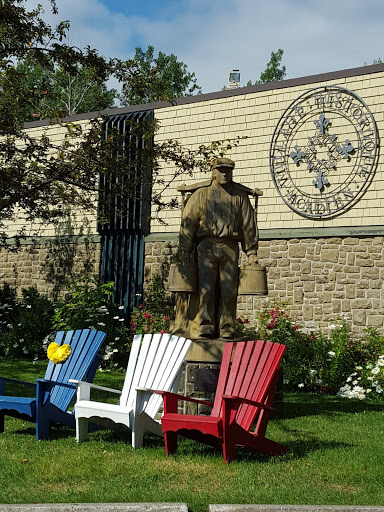
The colors of the Acadian flag at the VHA
The Acadians were French colonists who settled along Canada's maritime provinces - New Brunswick, Prince Edward Island, and Nova Scotia (also known as Acadia). They spoke French (still do - New Brunswick is Canada's only official bilingual province), and had very strong cultural traditions. I'll delve into our time at the Acadian Museum at the University of Moncton, and this site has fantastic information about the history of the Acadians, but for now, I'll give a brief historic overview - and then share some amazing photos from the VHA.
From the early 1600s until the mid 1700s, there was a steady flow of French colonists to Acadia. Then came the Grand Derangement, a forced exile of over 6,000 Acadians (some were settled in Louisiana, where they took their own culture and the local culture and became Cajun, a derivative of the word Acadian; others were settled in Maine and Quebec).
Nowadays, the Acadians whose ancestors settled in New Brunswick show great pride in their culture. Driving along the Acadian coast, you'll see the colors of the Acadian flag in yard after yard, in store windows, on flags hanging from lightposts, on lobster traps and Adirondack chairs. Acadian culture is alive and well, despite the stealing of lands, exile, and attempted submersion of the people and culture.
This culture has been shaped by the sea and the land, by hardship and community. At the Village Historique Acadien, you'll see hundreds of years of Acadian daily life, enhanced by actors who truly give a glimpse into each time period. You'll wander through woods and along paths, dropping your daily cares and worries with each step, entranced the entire time. In each building, re-enactors bring history to life.
Take a look...

In this house, a historical re-enactor showed how to weave. Look at the low ceilings, dark room, and tiny bed!

Carding flax to make thread

See that red star? That's a symbol of Acadia!
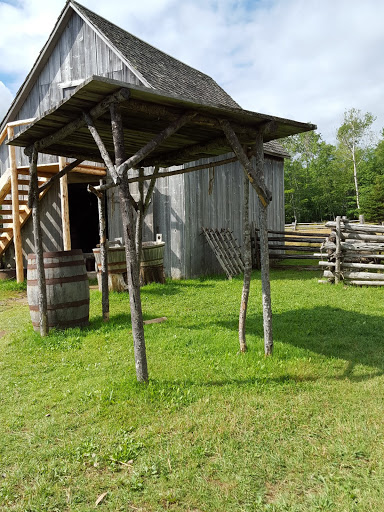
There were many farm outbuildings. I wonder what they used this roofed area for? At the Robichaud Farm, 1846.

The farms are spread with enough land in between to physically feel the time difference between buildings. Here, a glimpse from the Robichaud farm (1846) and its farm animals grazing over to the Doucet Farm (1860).
The walks are so very pleasant - isn't this an idyllic setting?


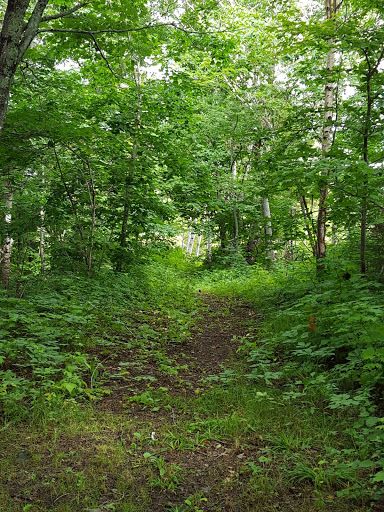

The Doucet Farm (1860)

Chicken coop at the Doucet Farm

Baking something yummy at the Doucet Farm

MOO goodness at Doucet Farm

Cut wood at the Babineau Farm (1855), which was used for this lovely fire...


Here, the women were making bread. Notice the dishes covered with cloths or other dishes - to keep out the bugs?

The fireplace and assorted pots, tools, and stacks of wood - ready to make a meal
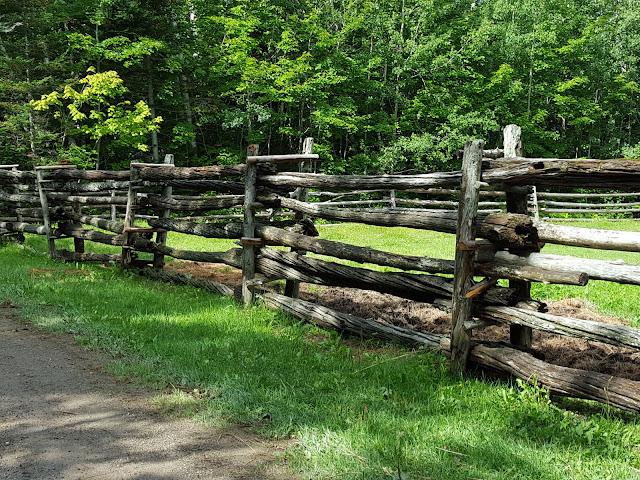

Fences are carefully tended along the path

Tavern (1880)
General Store (1889) - I loved being inside and seeing what was available for people to buy - the brown barrel was molasses; the red thing behind it was a washing machine


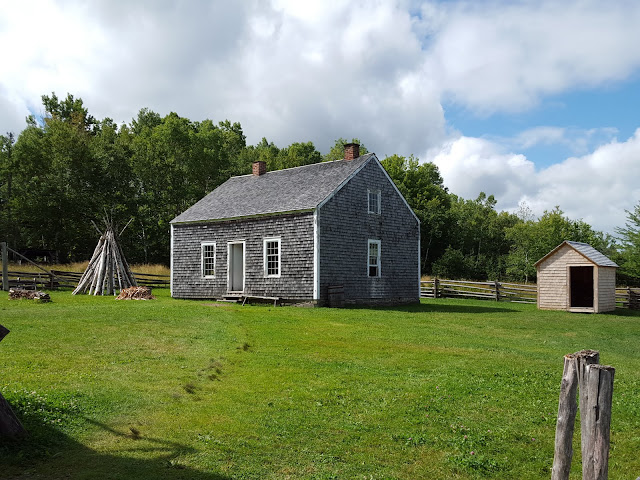
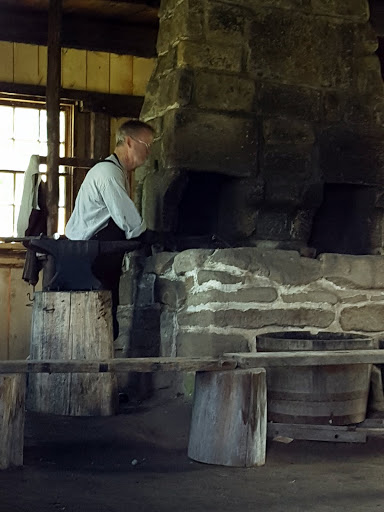
Well-tended blacksmith building (1874)

A farm cart at the Babineau farm (1855)


Geese loose and in a river pen
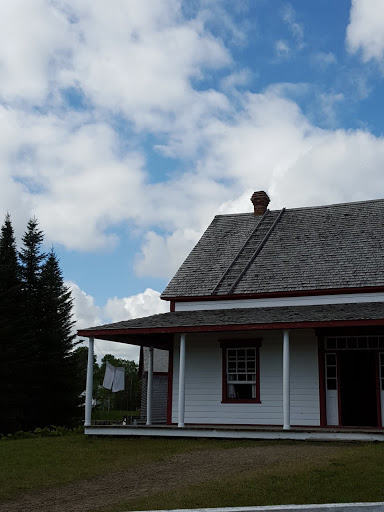
The Theriault Farm (1890) - laundry on a line!


The 1831 chapel's exterior and interior
My favorite building, so get ready for some photos! This is the Moulin a farine - Grist Mill (1895). It used the flow from the river to power the mill. When the miller gave the signal, the boy outside turned a wheel to divert some of the powerful water into this trough. When it filled up, it powered the mill and ground the flour. The flour was sorted into degrees of milling, with fine white flour being the most processed (and most expensive).

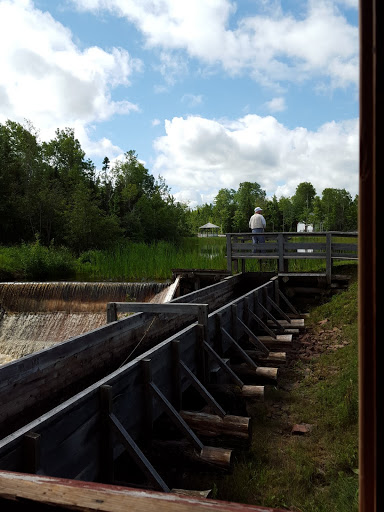
He turns the wheel to divert the water

See the trough filling up and coming into the mill?


Three different grinds of wheat

The heavy machinery - and a woodstove to keep warm!

This peaceful scene hides a loud, active machine inside!

The covered bridge (1900), taking you from the 1800s to the 1900s

The Moulin a bois - Wood Mill (1949)
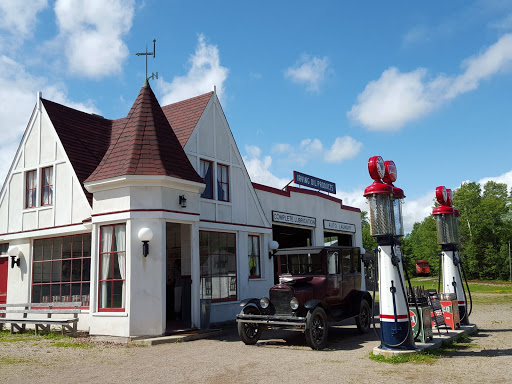
Irving Oil Co. Ltd (1936)

Gare - railway station (1930)

Hotel Chateau Albert (1907)

Magasin General - general store (1924)

Turgeon house (1928)

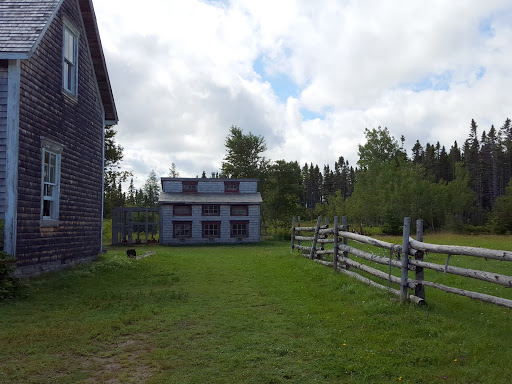
Chiasson house (1920), including the fanciest chicken coop I've ever seen

and a very friendly greeter

There are plenty of places to rest along the trail
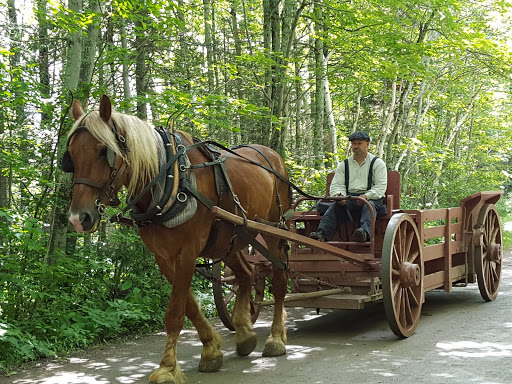
A cart and driver
Evangeline: A Tale of Acadie, by Henry Wadsworth Longfellow, is a very important story about Acadian history. The cafe at the VHA is called Magasin Evangeline. Stop in for a bite!


Tips on visiting the Village Historique Acadien
Most of the VHA is handicap accessible. The paths are dirt and gravel. Some buildings have steps that go in. When possible, there are wooden ramps that can be used to get over higher door sills. Ask for help - everyone was extremely friendly and worked very hard to make it accessible for me in my wheelchair scooter. People with disabilities and their attendant get in free.

(see me getting around?)
There is an entrance fee to get in, as well as paid guided tours in both French and English. Visiting this place is worth every penny, and then some.
LOVE the Acadian shop! It's located in the visitor center, where you enter the park
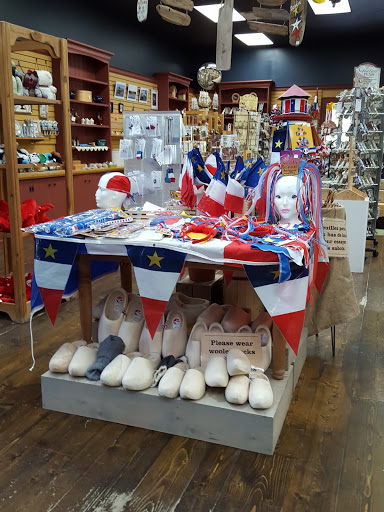
The VHA is kid-friendly - there are plenty of spaces to run around and burn off energy, animals to pet (love those cows), and buildings to explore.
The VHA is located near Caraquet, in Riviere du Nord, in northeast New Brunswick, along the Acadian coast.

A beautiful glimpse into a historic Acadian home
Learn more:
http://www.villagehistoriqueacadien.com/en
http://www.tourismnewbrunswick.ca/See/Acadie.aspx
http://www.tourismnewbrunswick.ca/Products/V/Village-Historique-Acadien-Product.aspx
https://en.wikipedia.org/wiki/Acadians
And see more of my photos at New Brunswick’s Colors of Acadian History
All photos courtesy and copyright Wandering Educators
